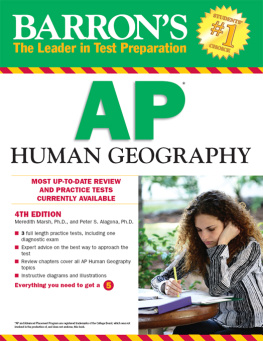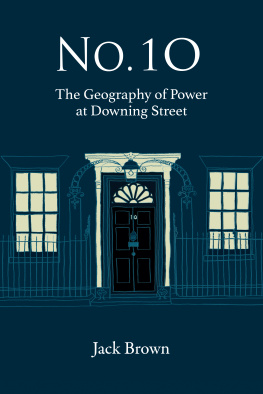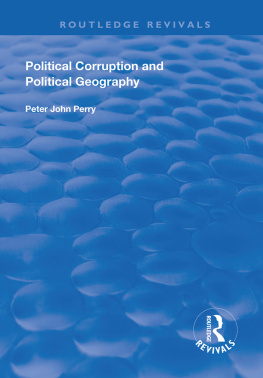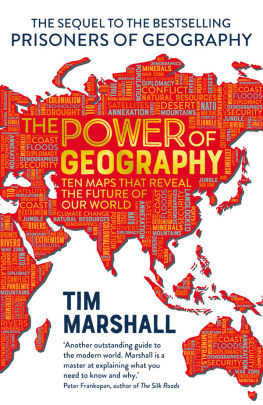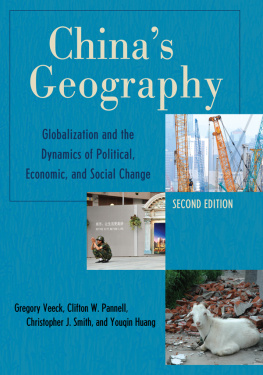ROUTLEDGE LIBRARY EDITIONS: HUMAN GEOGRAPHY
Volume 18
GEOGRAPHY AND POLITICAL POWER
GEOGRAPHY AND POLITICAL POWER
The Geography of Nations and States
PETER M. SLOWE
First published in 1990 by Routledge
This edition first published in 2016
by Routledge
2 Park Square, Milton Park, Abingdon, Oxon OX14 4RN
and by Routledge
711 Third Avenue, New York, NY 10017
Routledge is an imprint of the Taylor & Francis Group, an informa business
1990 Peter M. Slowe
All rights reserved. No part of this book may be reprinted or reproduced or utilised in any form or by any electronic, mechanical, or other means, now known or hereafter invented, including photocopying and recording, or in any information storage or retrieval system, without permission in writing from the publishers.
Trademark notice: Product or corporate names may be trademarks or registered trademarks, and are used only for identification and explanation without intent to infringe.
British Library Cataloguing in Publication Data
A catalogue record for this book is available from the British Library
ISBN: 978-1-138-95340-6 (Set)
ISBN: 978-1-315-65887-2 (Set) (ebk)
ISBN: 978-1-138-95728-2 (Volume 18) (hbk)
ISBN: 978-1-315-66174-2 (Volume 18) (ebk)
Publishers Note
The publisher has gone to great lengths to ensure the quality of this reprint but points out that some imperfections in the original copies may be apparent.
Disclaimer
The publisher has made every effort to trace copyright holders and would welcome correspondence from those they have been unable to trace.
Geography and Political Power
The Geography of Nations and States
Peter M. Slowe
First published in 1990 by Routledge
11 New Fetter Lane, London EC4P 4EE
Simultaneously published in the USA and Canada
by Routledge
a division of Routledge, Chapman and Hall, Inc.
29 West 35th Street, New York, NY 10001
1990 Peter M. Slowe
Typeset by Mayhew Typesetting, Bristol
Printed in Great Britain by
Richard Clay Ltd, Bungay, Suffolk
All rights reserved. No part of this book may be reprinted or reproduced or utilized in any form or by any electronic, mechanical, or other means, now known or hereafter invented, including photocopying and recording, or in any information storage or retrieval system, without permission in writing from the publishers.
British Library Cataloguing in Publication Data
Slowe, Peter M.
Geography and political power : the geography of nations and states.
1. Political geography
I. Title
320.1'2
ISBN 0-415-03912-6
Library of Congress Cataloging in Publication Data
Slowe, Peter M.
Geography and political power : the geography of nations and states / Peter M. Slowe.
p. cm.
Bibliography: p.
Includes index.
ISBN 0-415-03912-6
1. Geopolitics. 2. Power (Social sciences) 3. World politics. I. Title.
JC319.S56 1990 | 89-10399 |
320.1'2dc20 | CIP |
This book is dedicated to the memory of my father
MALCOLM SLOWE
Contents
List of figures
Acknowledgements
I would like to thank all the friends and colleagues who have helped me prepare this book.
In particular I am grateful to Ian Dutt for introducing me to Hip Hop, to Lyndon Gainham for his Channel Islands survey, and to Andy Lane for his ideas about the Western Sahara. I am also very grateful to my wife Karen and our friend Nikki Sparks who shared the typing, to my mother who kindly helped with my research on Guinea, to Diana Smith the excellent cartographer, and to the very helpful staff of the library at the West Sussex Institute of Higher Education.
My wife Karen was patient and tolerant throughout the occasional takeover of our household by Geography and Political Power and I could not have written the book without her being around and producing our son Alistair at the end of ! My late father, to whom this book is rightly dedicated, would have been rather pleased with both the baby and the book.
Peter M. Slowe
Angmering, West Sussex
Geographers are more important than they think. The subject they study lies at the very heart of political decision-making. From the World Bank to the parish council, from superpowers imposing their will on their neighbours to a provincial independence struggle in a famine-struck African state, it is geography that determines economic and political strategy and geography that determines cultural and military tactics. Only geography provides complete models of the world in which decisions are made; only geography focuses on the relationships between culture, economy, society, and polity, to model the whole landscape. The economists landscape is only economic, the historians landscape is only historical, the political scientists landscape is only political, and the sociologists landscape is only social; the geographers landscape is the real landscape of the decision-maker and the real landscape of action, because it is a landscape in which the objects and relationships which matter are highlighted, irrespective of the discipline into which they might otherwise fall; geography is the science of the land and the whole human environment. The problem is that geographers have forgotten the significance of what they do. Earlier in this century, and in the last century, geographers never hesitated to pronounce on all the political issues of the day; the work of geographers like Ratzel and Mackinder, for example, was central to political affairs, but recently geographers have allowed themselves to be pushed into the political sidelines and away from national and international affairs where they have the skills to contribute to matters of peace and war.
The aim of this book is to show the connections and introduce the modes of thought that will help to propel geographers back to the centre stage of national and international politics. Since it is anyway the case that geographical modes of thought are used in political decisions, what is now needed, if geographers are to reassert themselves, is for them to be aware of the political philosophies that lie behind the five main sources of political power. These are might (aggression and conquest), right (the mobilization of people who feel they have a right to territory), nationhood (the unique power of the nation-state), legality (the legal distribution of power and territory) and legitimacy (the reality of hegemonic power within and between states). The study of these five sources of power goes deeper into an understanding of politics than the geographical adaptation of some political ideas which is traditionally called geopolitics. This book discusses geopolitics but only to provide in certain cases a clearer understanding of the implications for geography of political thought.
Each of the books five chapters explores one of the five sources of power. In every case, there is an opening section on the general political philosophy associated with the particular source of political power. It is always followed by a section which develops or highlights some important aspect of the philosophy. Case-studies then illustrate the areas where the political philosophy is applied; each case illustrates a field where geographers have an important contribution to make.


